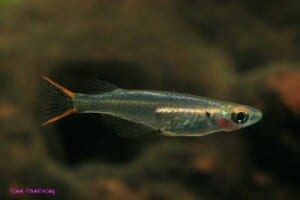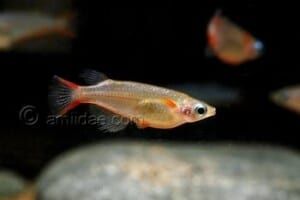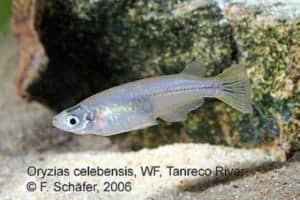Betta enisae
Betta enisae was described in 1995 by Kottelat. The species was named after Mrs. Enis Widjanarti.
Origin
The type specimen was caught at Sungai Santik; Borneo. Other capture locations include Kapuas river basin; Borneo and Sanggau area – Hulu area; Borneo.
Length
They can reach a total length of about 90 mm (TL).
Keeping Betta enisae
Betta enisae is a peaceful species which is not aggressive towards inmates but is somewhat aggressive towards its own species. Especially young males are regularly aggressive towards each other as well as females. The latter are also aggressive towards non-dominant males. Betta enisae requires a spacious tank of at least 100 cm but longer would be much better for 1 pair. Since this species likes hiding places, the tank should be well planted and have proper filtration. In the wild, this Betta is found in clear to light brown water with pH 5.5 – 6.5, GH 0 – 1, KH 0 – 1 and a temperature between 26° and 27°C.
Reproduction of Betta enisae
Betta enisae is a mouthbreeder. Also in this species the well-known “ball game” is evident; during reproduction the female takes the eggs in her mouth and then the female spits some at the male. If the latter is quick enough, the female has no chance to take them back quickly. This takes several times before the male is in possession of all the eggs. After reproduction, the male hides among the vegetation. After 10 days, the young are released and already have a length of almost 10 mm. After 9 months, they are fully grown.
Authors
Henk Grundmeijer – Stefan vd Voort – Dutch Association for Labyrinth Fish
Published in consultation with the board
Copyright images
H. Linke







